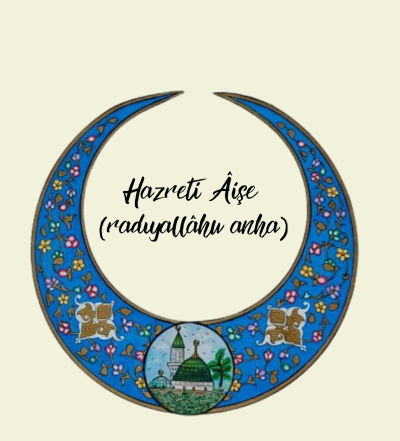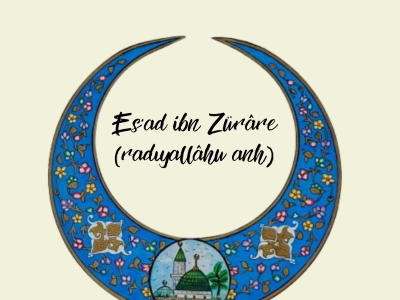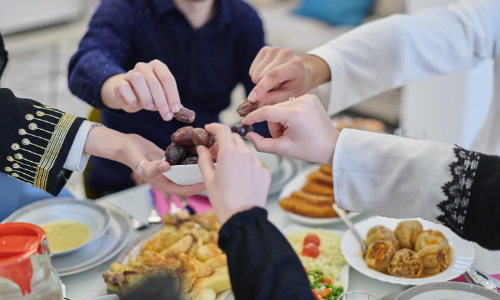Our eyes turn to a household from the Era of Bliss, approaching days to be quenched from the spring of sweet water. A household that, even during the Era of Ignorance, remained untainted by filth and honored by reaching the blessed era of the beloved Prophet, earning the distinction of being among the first Muslims.
The lady of the house is Umm Ruman, one of the rare women whom the Messenger of God (peace and blessings be upon him) complimented by saying, “If any person wants to see a beautiful virgin of Paradise, he can see Umm Ruman.”[1]
Her father is the honorable Abu Bakr (may God be pleased with him), known as “Siddiq” (the Truthful) due to his loyalty to the Prophet, to whom the Prophet also referred as Atiq, meaning “the one saved from Hellfire”. Even during the Era of Ignorance, he led a pure life and was among the first to honor himself with Islam, offering his support in the forefront and closest to the Prophet.[2]
From such a distinguished couple, a girl was to be born who would be a candidate to be the wife of the Prophet and the mother of the believers, a girl of honorable nature. Her name was Aisha (may God be pleased with her).
The greatest privilege of our distinguished mother was being the daughter of a father like the honorable Abu Bakr, who never touched the negativity of the Period of Ignorance. The honorable Abu Bakr, who paid utmost attention to his own life, had the same sensitivity in raising his children. Our mother Aisha first went through this educational journey and then continued to be educated by the Prophet (peace and blessings be upon him) after marrying him.
According to her own statement, the honorable Aisha (may God be pleased with her) would say, “As far as I can remember, I always recognized my parents as devout!”[3]
This influence led her and her sister Asma to decide to become Muslims at a very young age. Certainly, those were difficult times in Mecca, and believers were increasingly subjected to persecution. Since it became known that Abu Bakr had become a Muslim, they too had suffered many hardships, having experienced the difficulties and hardships of the boycott during the days of Shibu Abi Talib.
“Our mother Aisha, who experienced joy, severity, and hardship simultaneously, was preparing to narrate everything as memories for future generations, keeping a record of every event due to her interest in the science of history, essentially capturing the moment in a photograph. Thus, she was one of the best-informed individuals about which verses were revealed where, who became a Muslim when, and under what circumstances certain events occurred.”[4]
Marriage to the Prophet (peace and blessings be upon him)
Such a pure, clear, and intelligent mind was undoubtedly a candidate to be the wife of the Prophet.
After the difficult years of the boycott and the death of the honorable Khadija, the Messenger of God was going through very tough times.
Gabriel, who had appeared in the dreams of the Pride of Humanity several times, came with a different piece of good news this time. Gabriel pointed to our mother Aisha, wrapped in emerald-green silks, and gave the glad tidings to the Messenger of God (peace and blessings be upon him), “She is your wife in this world and the Hereafter.”[5]
Indeed, the Divine will was manifesting. Aisha was appointed as a special advisor to her Beloved, intending to transfer confidential knowledge, which could not be known by others, to his nation for the path everyone walks.[6]
Her marriage to the Prophet (peace and blessings be upon him) took place two or three years before the Hijrah, in the month of Shawwal. The honorable Aisha is the only wife whom the Prophet married while she was single. The Prophet loved her deeply due to her closeness to God. He gave her the nickname “Humayra” and said, “Take half of your religion from this Humayra.”[7]
The beloved Prophet expressed his love for Aisha to his other wives by saying, “Revelation comes to me only when I am with Aisha.”
Indeed, humanity learned a lot from the life and narrations of the honorable Aisha. She played a role in changing the wrong perceptions of women during the Era of Ignorance. Considering the status and position of women at that time, Islam elevated women to a very high status, as clearly seen in the Prophet’s interactions with Aisha.
When the Messenger of God (peace and blessings be upon him) prepared to set out for a campaign, he would draw lots among his wives. The one whose name was drawn would accompany him. Once, when the lot fell on Aisha, as they were traveling with the army and reached a certain point, the Prophet told the army to continue marching and stayed back with Aisha. “Let’s have a race,” he said to her. Aisha reached the designated point first.
Time passed, and on another journey, the Messenger of God (peace and blessings be upon him) suggested they race again. This time, the Prophet reached the goal first. Smiling, he said to Aisha, “This makes up for the previous race.”[8]
The reason for these races was significant: to change the wrong perception about women in society at the time. Our noble mother was at the forefront of this representation.
The Incident of Ifk
As in every era, the network of evil was active, playing games and casting aspersions that even the devil would not conceive.
The honorable Aisha accompanied the Messenger of God (peace and blessings be upon him) to the campaign of Banu Mustaliq. Since the revelation of the verse of hijab had occurred before this campaign, she was being transported in a howdah (camel palanquin) and was set down during stops. On their return to Medina, when the Prophet ordered the camp to move, Aisha left her howdah to relieve herself. Upon returning, she realized she had lost her necklace and went back to look for it. After finding it, she returned to find that the army had left without her, thinking she was still in her howdah. Believing they would return to her, she wrapped herself in her cloak and fell asleep while waiting.
Safwan ibn Muattal, who was trailing behind the army to pick up any stragglers, found her asleep. Recognizing her, he woke her up, mounted her on his camel, and led her to catch up with the army. As they approached the camp, they encountered Abdullah ibn Ubayy, the chief hypocrite, who, upon seeing them, launched vile accusations and spread slander. Some Muslims were swayed by his slanderous claims.
The Prophet and Aisha’s parents were deeply troubled by the rumors. Unaware of the accusations, Aisha became ill after the campaign and only later learned of the slander. She sought permission to stay at her father’s house, where she wept for days from distress. After a painful wait, divine revelation came, proclaiming her innocence and the fate of the slanderers in verses 11–22 of Surah an-Nur.[9]
Revelation of the Verse about Tayammum
During another expedition with the Prophet, they reached the location of Bayda or Zatu’l-Jaysh between Medina and Mecca, where Aisha noticed her necklace had fallen off. The Prophet sent some people to look for it. The Muslims found themselves in a place without water, and as the time for the Morning Prayer approached, some began to worry about the inability to find water for ablution. However, this seemingly negative incident led to a facilitation: the revelation of the verse of Tayammum. Everyone prayed for her, grateful for the ease she had brought.[10]
Her Scholarly Aspect
The honorable Aisha was known for her eloquence and persuasive speech. The prayers she made at her father’s grave and some of her letters are masterpieces that demonstrate her literary talent.[11]
She was knowledgeable in various fields, including literature, history, exegesis, hadith, jurisprudence, theology, and sociology. Her expertise in medicine was derived from the physicians who treated the Prophet during his illness.[12]
Towards the end of the Prophet’s life, he chose to stay in Aisha’s house with the permission of his other wives and passed away there. Aisha narrated, “He passed away on the day he was due to stay in my house, and God took his soul while his head was resting between my chest and neck.”[13]
After the beloved Prophet passed away, Aisha continued to pursue knowledge. Her small room became a hub of learning, and she is known to have narrated 2210 hadiths. She stood out among those who narrated the most hadiths because she explained the reasons behind the hadiths, scrutinized them for any conflict with the Qur’an, and corrected errors made by some Companions during narration.[14]
Aisha lived for 47 years after the Prophet’s death. Al-Waqidi states that she passed away on the 17th of Ramadan, in the 58th year after the Hijra, on a Tuesday.[15] She dedicated her life to the cause of God and His Messenger, fasting and praying extensively after the Prophet’s death.
She loved to give to charity, often distributing everything she had. One day, when Umm Durr gave her 100,000 dirhams, Aisha distributed all of it, to which Umm Durr remarked, “O Aisha, you should have kept a dirham for yourself to buy meat.” The honorable Aisha replied, “If you had reminded me earlier!”[16]
Though her greatest wish was to be buried at the Prophet’s feet, she gave up this wish out of respect for the honorable Umar’s request, saying, “I prefer Umar over myself.” She lived a blessed life, serving as an example to everyone, and was buried in Jannatul Baqi cemetery.
[1] Hakim, Mustadrak, 3/538; Ibn Sa’d, Tabaqat, 8/276; Ibn Hajar, Isaba, 8/207.
[2] Reşit Haylamaz, Mü’minlerin En Mümtaz Annesi Hazreti Âişe radıyallâhu anha, İstanbul: Işık Yayınları, 2012, p. 14.
[3] Bukhari, Tafsiru’l-Qur’an, 272, Adab 93 (5804); Muslim, Rada, 2 (1445); Tirmidhi, Rada, 2 (1148); Ahmad b. Hanbal, Musnad, 6/177 (25482); Malik, Rada, 1 (1279); Darimi, Niqah, 48 (2248); Nasai, Niqah, 49 (227).
[4] Haylamaz, ibid, p. 28.
[5] Tirmidhi, Manaqib, 63.
[6] Haylamaz, ibid, p. 31.
[7] Reşit Haylamaz, “Hazreti Âişe Validemizin (radıyallâhu anha) İlmî Yönü” www.youtube.com/watch?v=sJ72QGU4tXI
[8] Abu Dawud, Jihad, 68 (2578); Ahmad ibn Hanbal, Musnad, 6/39 (24164); Tabarani, Al-Mu’jaamu’l-Kabir, 23/47; Bayhaqi, Sunan, 10/17, 18.
[9] M. Âsım Köksal, Peygamberler Peygamberi Muhammed Aleyhisselam ve İslamiyet-2, p. 751–766.
[10] Bukhari, Teyemmüm, 1; Fedâilü’s-Sahabe, 5 (3469); Müslim, Teyemmüm, 108 (367).
[11] Mustafa Fayda, “Âişe”, islamansiklopedisi.org.tr/aise
[12] Ahmed b. Hanbal, Musnad, 6/67 (24425); Hakim, Mustadrak, 4/218 (7426) Haythami, Majmau’z-Zawaid, 9/242.
[13] Bukhari, Janaiz, 94 (1323), Muslim, Fadailu’s- Sahaba, 84 (2443).
[14] Fayda, a.g.e.
[15] Abu Nuaym al-Isfahani, Ibn Qayyim al-Jawziyya, Sahabeden Günümüze Allah Dostları, Tr. Yahya Atak et. al. İstanbul: Şule Yayınları, 2003, p. 128.
[16] M. Yusuf Kandehlevî, Hayatü’s-Sahabe 2, İstanbul: Okusan, 1993, p. 53; Ibn Hajar, Al-Isaba, 8/20.




